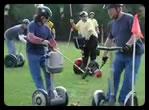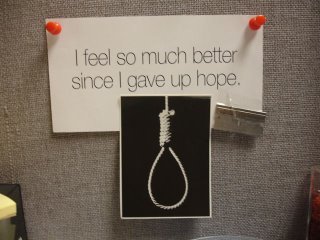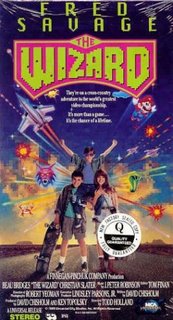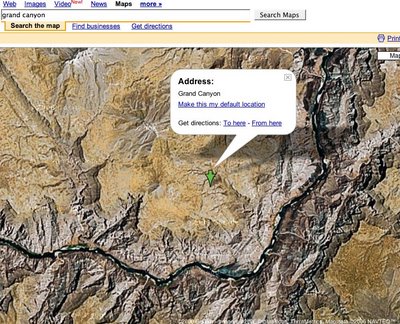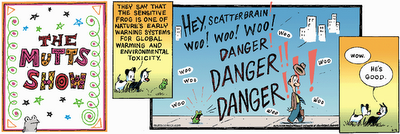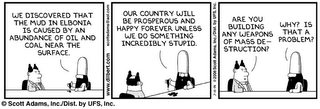Tuesday, December 26, 2006
The giant winged guy in the back
My younger and more informed cousin will occasionally indulge me in the gossip loop surronding those very interesting online communities built over cult favorite games like unreal tournament, halo, etc. Basically folks who don't give a second thought to understanding a group of capital letters like: 'MMORPG'. World of Warcraft being one of the closer ones to mainstream (i suspect Coke is commisioning a commercial as i type. (1, 2) I unfortunatley have no immediate friends who play- which is why i'm only hearing about this now.
Emergent gaming is an emerging concept discussed within the circles of these Internet communities- it's where the mass culture of the gamers begins to intereact within and with that world in an unexpected way- surprising even the designers. The classic example of this would be the above video showing the result of a few trickster players working for 45 minutes to lure a near invincible boss to the nearby town of Stormwind- hence inviting a sort of Godzilla scenario and a tremendous group response for all the townsfolk, all of whom died (in game) and ultimatley causing a real life server crash. If you don't kill Kazzak in under 3 minutes, he enters supreme mode and is of course, invincible. The event for sure headlined all the fan sites.
I was fascinated with the collective stir it caused among that community- how it forced many people to work unexpectedly work together during a serious chrisis- what that virtual behavior sets up for folk who will likely never unite with strangers against an obvious foe. They're town was under attack and being basically super heroes in training, they were going to damn well do something about it. If WoW was smart they'd have monsters attacking Stormwind as regulalry as they attack Agrabah.
Also the event occuring within the system itself- which invited a patch to solve the unforseen problem. Argueably by being updated or taught further, the game is learning.
Wednesday, December 20, 2006
I think the singularity involves animals

A Recent Boing Boing post led me to this article where MIT researches describe the possibility that Rats may dream in a similar manner to humans.
"Wilson showed that rats formed complex memories for sequences of events experienced while they were awake, and that these memories were replayed while they slept--perhaps reflecting the animal equivalent of dreaming...
...In the latest experiment, by recording brain activity simultaneously in the hippocampus and the visual cortex, Wilson and Ji demonstrated that replayed memories did, in fact, contain the visual images that were present during the running experience."
Another recent news item describing how Elephants can recognize themselves in mirrors is another step in understanding the connections between humans and other animals. If some great technological breakthrough is on our horizon, I feel the implications will weigh heavily upon our understanding and interactions with other animals. Up to this point technological progress has been a very human centric endeavor; perhaps a reorganization of our relationship to technology also means a reorganization of our relationships to other species of "animals"
Tuesday, December 19, 2006
New Action Sports
Wednesday, December 06, 2006
Revolution 9?

I was looking at a page of bealtes midi songs, and there was a link for "Revolution 9". I was extremely curious as to how someone would translate the John Lennon sound collage into a midi programmable piece. This midi re-interpretation is an interesting artifact, due to the fact that midi here is completely incapable of creating anything resembling the original recording.
Also the midi artist is anonymous.
Tuesday, December 05, 2006
Scary Santas

Here is a link to a group of photos of children being scared of Santa in photos. The photos were submitted by viewers of the website. It is fabulous
Originally from Boing Boing
Friday, November 17, 2006
"My Hard Drive is Experiencing some Strange Noises"

Gregory Chatonsky recorded this sensative and subtle sound piece by placing a sensor near a defective hard disk and recording vibrations.
It seems technology is often taken for granted. "Obsolete" computers and cell phones are easily dismissed as archaic and unworthy of the times. This is unfortunate becuase they are still amazing and complex as objects. This piece appears able to tap into an unsuspected function of this device and utilize all the years of work and research put into its development for an entirely different purpose, therefore negating its classification as obsolete. Re-assigning it a new function.
The sound itself seems so complex and intriguing, there are layers of textures and overtones which change and exchange at what sounds to be just the right moments, even though it is completely random.
This piece brings to mind the idea of all the sounds that are too soft for us to hear, or not in the frequency range of human hearing.
This piece may also be classified as the amplified sound of a computer thinking.
Discovered via VVORK
Tuesday, November 14, 2006
Tuesday, November 07, 2006
Second Life Artist-in-Residence
Ars Virtua Artist-in-Residence (AVAIR) is an extended performance that examines what it means to reside in a place that has no physical location.
Saturday, October 28, 2006
Friday, October 27, 2006
Medium: Browser
"A painting has got to have balls!" ~Jackson Pollack
http://www.jacksonpollock.org/
Sunday, October 22, 2006
Music for 50 Carpenters
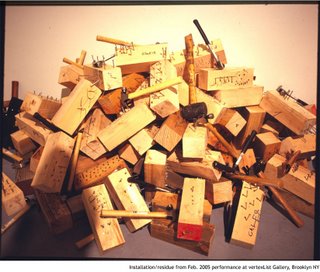
Here's a link to a piece put together by artist Douglas Henderson. There is an mp3 of an excerpt from the performance on the page. Just from the small section you can hear the intensity of the piece as there are both moments of hammering that democratize into white noise and others that organize and create a hierarchy of sound and varying intensities and timbres.
A blurb from his website:
Music for 50 carpenters is: "..A theatrical surround sound work enlisting 50 skilled tradespeople. Prying at Stockhausen’s convolution theory of rhythm and timbre, 50 hammers, 50 blocks of wood and some 4000 nails of varying sizes are brought to bear. Under the guidance of a job supervisor hundreds of hammer blows become waves of tonal murmur threaded with rustlings of nails in bags and occasional snarls of righteous indignation. The performers are organized into work crews with lists of tasks and schedules, and arranged in a circle around the audience. Toolbelts, sweat and lunchboxes are part of the score, and union regulations governing breaks and meals are observed"
Thursday, October 19, 2006
Post-Reagan
eye space

Origianlly from Networked_performance:
"Last week, audience members enjoyed a unique experience in maverick choreographer Merce Cunningham’s newest piece, eyeSpace. Using iPod Shuffles, each member of the audience heard different pieces of composer Mikel Rouse’s score, International Cloud Atlas. The audience was provided with iPod shuffles, set to play the score’s tracks in a random order, giving each viewer a distinct viewing experience.
Audience members were requested to bring their own iPods, loaded with the score they downloaded from this page, to play during the performance of eyeSpace. For those who didn't have their own iPods, iPod Shuffles were available for use on loan (at no cost) at The Joyce Theater.
With your ticket purchase, audience members were also entitled to receive a free download of select tracks from Mikel Rouse’s score. [via Great Dance]"
Thursday, October 12, 2006
Saturday, October 07, 2006
The Michael Jordan of StarCraft

Here is a NYTimes article written by Seth Shiesel that highlights the rise if the video gaming star in South Korean Culture.
Some excerpts:
"The finals of top StarCraft tournaments are held in stadiums, with tens of thousands of fans in attendance."
“'I watch basketball sometimes, but StarCraft is more fun. It’s more thrilling, more exciting.'”
" '... In America they have lots of fields and grass and outdoor space. They have lots of room to play soccer and baseball and other sports. We don’t have that here. Here, there are very few places for young people to go and very little for them to do, so they found PC games, and it’s their way to spend time together and relax.'"
"IT’S all part of a dynamic that has taken technologies first developed in the West — personal computers, the Internet, online games like StarCraft — and melded them into a culture as different from the United States as Korean pajeon are from American pancakes. "
Thursday, October 05, 2006
Dead Bachelors in Remote China Still Find Wives
 NY Times article:
NY Times article:
"To ensure a son’s contentment in the afterlife, some grieving parents will search for a dead woman to be his bride and, once a corpse is obtained, bury the pair together as a married couple. "
"...The rural folk custom, startling to Western sensibilities, is known as minghun, or afterlife marriage. Scholars who have studied it say it is rooted in the Chinese form of ancestor worship, which holds that people continue to exist after death and that the living are obligated to tend to their wants — or risk the consequences."
more
Monday, October 02, 2006
Space is the Place...for peace
Keep Space for Peace Week: Oct 1-8, 2006
 October 1 - 8, 2006 are "International Days of Protest to Stop the Militarization of Space," according to Space4peace.org. "No Weapons in Space! Stop Star Wars Research & Development! Convert the Military Industrial Complex! Fund Human Needs." Link
October 1 - 8, 2006 are "International Days of Protest to Stop the Militarization of Space," according to Space4peace.org. "No Weapons in Space! Stop Star Wars Research & Development! Convert the Military Industrial Complex! Fund Human Needs." Link
Monday, September 18, 2006
Hack the Vote
Here ends democracy
Saturday, September 16, 2006
Internet Killed the Rock'n'Roll Star
Derek and I had a discussion several months ago about the decline or death of rock and roll and the new dominance of what’s come to be known as hip hop. He had some excellent theories to back him up and I found myself in concurrence. A month or so after adding this idea to the torrent of ‘new media theory’ I’ve been looking at, I was conversing with a friend who was talking about what he wants to do next with his life. He ended his collected thoughts and vague possibilities with a half serious jest that ‘becoming a Rock Star would solve all of his problems’. I say half serious because he is pursuing traditional acoustic song writing on the side, set up a myspace account, plays out occasionally and so on.
This seemed to conflict with Derek’s idea and I’m trying to determine if the Rock Star has/will die with Rock. Perhaps the Rap Star is the new Rock Star, but something about the diffusion of culture right now doesn’t give them as much iconic authority as what I’d see as a traditional Rock Star I guess Pop Star can’t be excluded either… but who is the last modern music ‘star’ anyone can remember? (well I just remembered Eminem so he kind of puts a hole in this and since I’m writing this off the cuff, please suggest others I’m missing if you want to refute all this) I’m sure some can be clearly sited as prominent figures in the industry, but anyone that has near the communication power of Lennon? Dylan? Kobain? Springsteen? Even more corporately propelled stars like Madonna don’t speak with any significance to their audience anymore being drowned in a broader bandwith of cultural musical output. It can also be stated that I’m out of touch with the popular music scene and have been since the late 90’s, but that’s not relevant to this inquiry (ithink). Basically Rock, and the Rock Star, no longer exist as they used to. That culturally powerful authority position- the purveyor of cool, fun and/or bad ass, is vacant.
When ‘Rock’ first gained weight as a genre and more so as a medium, it offered the opportunity for individuals or a group of individuals to craft potent, fun, occasionally message laden expression. As the story goes, the output created defined an era- rock music and all of it’s progeny so much permeate the social landscape that it’s not even looked at as a form of expression among other forms of expression, but the foundation for musical expression in today’s culture itself. My original cultural and socialized understanding of American music history got a little fuzzy before Elvis, before Rock. Many saw it/see it as the only true expression of the spirit which no other medium could touch or outdo. How loud the chord was struck, how right it felt can be summed up in the naïve assumption that, ‘Rock and Roll will Never Die’ (Young).
The important part of this all is the low start-up cost of becoming a rock star. Despite how the music industry operates today, music is still a medium of the people. People see and hope that all you really need is a guitar, some talent and some luck, and anyone can be a rock star and big time purveyor of cultural content. While a similar medium gaining prominence around the 1950’s, television, has perhaps further reaching modes of expression, the tools and costs for individuals or groups to create anything for that medium were not realistic. This of course leads us to the Internet, where we all know how the affordability of media editing tools and distribution possibilities of our (our=*cough. Net neutrality. Cough*) world wide web are changing this notion. So this is where the wondering begins. With the growing impotence of Rock and the huge diversity of music available, it may not be possible for music stars to exist like they used to, unless they morph into the Internet Star. We talk a lot about the Internet dethroning television, but I think it may also be dethroning the role popular music plays as we’ve come to know it.
In the end, if media ecologists like Marshal Macluhan and Neil Postman are to be believed, every new medium offers it’s own unique world of discourse and is never an extension of previous mediums. Television is not an extension of Radio, Internet is not and extension of Television. And while these mediums affect each other, they’re totally different in what type of output they’re prone to making. But again, I’m talking about the position and function these mediums occupy in modern culture, not which ones are better at what.
Now for us sci-fi futurists who attempt to foresee the evolution of internet/interactive media, to show what the Internet Star could become, I look at the work of Will Wright. His name has been attached to such milestones in interactive media like Sim City 2000 and The Sims franchise- he’s currently working on a new project which is bound to be another revolution in the gaming industry called ‘Spore’. Basically a simulation of ‘evolution’, you start as a one-celled organism trying to survive in a 2-D environment. After surviving as the fittest, you have the opportunity to evolve and evolve you do, the user designing every facet of there creature along the way, moving to an aquatic environment, then crawling onto land, and ultimately starting a civilization. The game gets even more macro but the content is not what’s important here, it’s the tools.
Spore is the first mass market experiment with what’s becoming known as ‘Procedural Content Generation’ (PCG). An indirect result of the Demoscene, PCG can best be explained by comparing a game like this to more traditional ones. Previous games like this required armies of programmers and animators to design all of the content for the various roads you can take your creature/society down, but with PCG it is instead designed with algorithms which create the animations and basically everything else in that virtual world, on the fly. It’s like animated clay and legos, and it allows for tremendous versatility in design in 3-D space.
Maybe I’m trying too hard, but I want to compare something like this to a newish form of rock star, the DJ. DJ’s reside in a specific sub-culture, but they take the outputs of generations of sound makers and will create there own sounds, ‘on the fly’. What interests me in the evolution of Internet media, and the Internet Star, is as new forms of content generation spread, what kind of work could be created? And I suspect with the growing sophistication of technology and audiences, even the Internet Star could give way to something even more media encompassing. Let’s DJ reality?
Thursday, September 14, 2006
Monday, September 11, 2006
What's today's date?
and enjoy this picture as well.

The joke is in the papers and on the tv stations.
This graphic is from Newsday.
Here is actually a good article from Newsday (surprising I know!) about how the rest of the world today "Remebers 9-11, but many not crying". From the article:
German Chancellor Angela Merkel -- an advocate of repairing ties with Washington that were frayed under her predecessor Gerhard Schroeder -- had veiled criticism of the United States, saying: "The ends cannot justify the means."
"In the fight against international terror ... respect for human rights, tolerance and respect for other cultures must be the maxim of our actions, along with decisiveness and international cooperation," she said.
..."You gave us every legitimacy and every opportunity to continue fighting you," said Ayman al-Zawahri [senior Al-Qaida leader], addressing the United States.
....New Zealand's Prime Minister Helen Clark joined many when she said: "No, we're not more secure since 9/11."
Saturday, September 09, 2006
Retirement Artists Complex

Here is a NYTimes article about a Burbank Complex designed specifically for retired people. It was created:
"With the understanding that not everyone wants the old-school model of golf course retirement...
...the colony offers artful self-expression: a digital film editing laboratory, a theater, drama classes and studios open for inspiration 24 hours a day. "
Now all they need is prescription psychadelics to complete the package...
Wednesday, September 06, 2006
let's start a new trend.
i had a dream in which doug was trying to convince me that the new trend in facial hair was the inverse beard (basically you shave where the beard would be).
that rules.
Tuesday, September 05, 2006
on the lines, out of the air waves
Monday, September 04, 2006
Really Dramatic
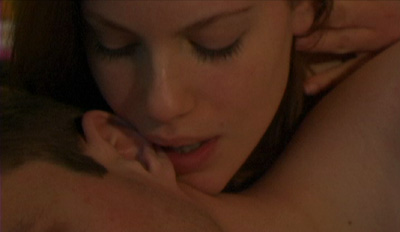
I've finally finished watching all the available episodes of Young American Bodies, an online soap opera created by Joe Swanberg (LOL, Kissing on the Mouth). Everyone should watch these episodes, I can't figure out how to write about them, but they exist somewhere in the fuzzy/ awkward line between soap opera and reality tv. It's all about sex and twenty something relationships, but some of the understated moments of narrative in the show are very beautiful and honest. It's all for your free viewing pleasure at nerve.tv in streaming video format.
Sunday, August 27, 2006
Since 1986 Bob Dylan has lost his wang

In and interview with rolling Stone Bob Dylan is quoted as saying:
"I don't know anybody who's made a record that sounds decent in the past 20 years, really,"
"You listen to these modern records, they're atrocious, they have sound all over them," he added. "There's no definition of nothing, no vocal, no nothing, just like ... static."
It's sad when someone who used to be so revolutionary as Bob Dylan is suddenly trying to codify "good" and "bad" sounding recordings. One would hope that he could embrace digital technology for all its faults, not because it sounds like analog, but because it is what exists and it allows for much more massive transfer of media than analog. Listening to an i-pod will never "feel" like sitting in the living room listening to vinyl, but the differences between the two should be exploited by the songwriter and not just complained about.
So I propose that Bob Dylan should retire from cool, and we should make him a playlist to listen to in the "retired from cool retirement home". I'll start with a few albums that have been both good and released since 1986 and maybe even a product of the digital environment:
OK Computer and Kid A- Radiohead
Pinkerton - Weezer
Yoshimi Battles Pink Robots - Flaming Lips
post some more?
Saturday, August 26, 2006
Freak Out! It's NOT a Terrorist!

T-Shirt that says "I am not a terrorist" in Arabic.
From the creator's website:
"I offer this shirt as my response to the ridiculousness of the hysteria...The real point of terrorism is not the act itself, but our reaction to the act. We are reacting badly. Buy a shirt, don't buy a shirt, I don't care. Let's just all calm down."Tim Murtaugh, the creator, made it:
"After reading about blogger Raed Jarrar's experience at JFK (he was forced to take off a shirt with Arabic writing on it or miss his flight) "
I agree with his assertion that the terrorists are winning right now. Here's why:The goal of international terrorism is to subvert the government by causing lawmakers to overreact and induce fear in it's citizens (via rediculous laws and anti-terror measures). The media is an accomplice in all the terror ranting, by creating hysteria over potential attacks instead of actual attacks. Since the government is elected by the people of the country, it allows the terrorists to claim that ALL the citizens of a country are responsible for it's foreign policy...and therefore they can attack the citizens. (wtf? I wasn't even born when Ronald Reagan first took office...how am I suddenly implicated in this?)
The more we react to terrorism, the more the terrorists will be encouraged to continue it....didn't any of our lawmakers take any sort of political science course? Gosh! This all seems pretty basic...I really don't understand.
Thanks to Boing Boing for the link
Friday, August 25, 2006
We all speak
www.droppingknowledge.org
Monday, August 14, 2006
Open the Future
Twelve Things Journalists Need To Know to be Good Futurist/Foresight Reporters
Originally published (in somewhat modified form) June 14, 2006
J. Bradford DeLong and Susan Rasky, at the Neiman Foundation for Journalism at Harvard, compiled lists of what economists need to know about journalists, and what journalists need to know about economists, in order to result in useful and accurate economic reporting.
This is a remarkably good idea, one with direct application in a number of disciplines that are important for society but prone to obfuscation and confusion in the press. Such lists could be valuable to journalists who are, by and large, generalists talking about fields that they probably didn't study, under time and financial pressure from editors and publishers who almost certainly know even less.
1. "Prediction is very hard, especially when it's about the future." -- Yogi Berra Completely accurate foresight is a rare thing; most of the time, good futurism means getting key elements right, even if the superficial details are wrong. Predictions based on physical principles and scientific knowledge tend to do better than those based on "trendspotting" and "cool hunting," and are more likely to be corroborated by other specialists. In every case, however, the most important question to ask is "why?" Why would the suggested change happen? Why would people make the predicted choice? Why would we see this particular outcome?
2. Not everyone is surprised by surprises. The corollary to #1, be on the lookout for people who saw early indicators of surprises before they happened. Just like an "overnight success" worked for years to get there, the vast majority of wildcards and "bolt from the blue" changes have been on someone's foresight radar for quite awhile. When something happens that "nobody expected," look for the people who actually did expect it -- chances are, they'll be able to tell you quite a bit about why and how it took place.
3. Even when it's fast, change feels slow. It's tempting to assume that, because a possible change would make the world a decade from now very different from the world today, that the people ten years hence will feel "shocked" or "overwhelmed." In reality, the people living in our future are living in their own present. That is, they weren't thrust from today to the future in one leap, they lived through the increments and dead-ends and passing surprises. Their present will feel normal to them, just as our present feels normal to us. Be skeptical of claims of imminent future shock.
4. Most trends die out. Just because something is popular or ubiquitous today doesn't mean it will be so in a few years. Be cautious about pronouncements that a given fashion or gadget is here to stay. There's every chance that it will be overtaken by something new all too soon -- and this includes trends and technologies that have had some staying power.
5. The future is usually the present, only moreso. Conversely, don't expect changes to happen quickly and universally. The details will vary, but most of the time, the underlying behaviors and practices will remain consistent. Most people (in the US, at least) watch TV, drive a car, and go to work -- even if the TV is high definition satellite, the car is a hybrid, and work is web programming.
6. There are always options. We may not like the choices we have, but the future is not written in stone. Don't let a futurist get away with solemn pronouncements of doom without pressing for ways to avoid disaster, or get away with enthusiastic claims of nirvana without asking about what might prevent it from happening.
7. Dinosaurs lived for over 200 million years. A favorite pundit cliche is the "dinosaurs vs. mammals" comparison, where dinosaurs are big, lumbering and doomed, while mammals are small, clever and poised for success. In reality, dinosaurs ruled the world for much, much longer than have mammals, and even managed to survive a planetary disaster by evolving into birds. When a futurist uses the dinosaurs/mammals cliche, that's your sign to investigate why the "dinosaur" company/ organization/ institution may have far greater resources and flexibility than you're being led to believe.
8. Gadgets are not futurism. Don't get too enamored of "technology" as the sole driver of change. What's important is how we use technology to engage in other (social, political, cultural, economic) activities. Don't be hypnotized by blinking lights and shiny displays -- ask why people would want it and what they'd do with it.
9. "Sports scores and stock quotes" was 1990s futurist-ese for "I have no idea;" "social networking and tagging" looks to be the 2000s version. Technology developers, industry analysts and foresight consultants rarely want to tell you that they don't know how or why a new invention will be used. As a result, they'll often fall back on claims about utility that are easily understood, familiar to the journalist, and almost certainly wrong.
10. "Technology" is anything invented since you turned 13. What seems weird and confusing will become familiar and obvious, especially to people who grow up with it. This means that, very often, the real utility of a new technology won't emerge for a few years after it's introduced, once people get used to its existence, and it stops being thought of as a "new technology." Those real uses will often surprise -- and sometimes upset -- the creators of the technology.
11. The future belongs to the curious. If you want to find out why a new development is important, don't just ask the people who brought it about; their agenda is to emphasize the benefits and ignore the drawbacks. Don't just ask their competitors; their agenda is the opposite. Always ask the hackers, the people who love to take things apart and figure out how they work, love to figure out better ways of using a system, love to look for how to make new things fit together in unexpected ways.
12. "The future is process, not a destination." -- Bruce Sterling The future is not the end of the story -- people won't reach the "future" and declare victory. Ten years from now has its own ten years out, and so on; people of tomorrow will be looking at their own tomorrows. The picture of the future offered by foresight consultants, scenario planners, and futurists of all stripes should never be a snapshot, but a frame from a movie, with connections to the present and pathways to the days and years to come.
When talking with a futurist, then, don't just ask what could happen. The right question is always "...and what happens then?"
by Jamais Cascio -- for more information, write to cascio at openthefuture dot com
Copyright 2006 Jamais Cascio
Saturday, August 12, 2006
Internet Gallery mondo awesome face
The works in Faultlines consider the desires, fictions and anxieties embedded in online communities and also reveal how "real-world" issues, such as commerce and international politics, drive relationships in the virtual sphere just as they do offline.

My favorite pieces were automated beacon, the dumpster, and the myspace intro playlist. They play well into the thesis of the show, and the interface of "the dumpster" is really a fantastic way to experience the endless supply of personal internet ventings in a way that allows you to really feel overwhelmed by the size of the internet.
The interesting thing about having an online exhibition is that there is no ownership to the curator or webspace. The links in the show are accessible without ever going to rhizome's website, and therefore the exhibition acts more like a mixtape than a museum style show with actual objects. There is no need to claim ownership of organizing these works, the show is created much more for the experience of the work than the curatorial pat on the back, or any sort of monetary gain.
Friday, August 11, 2006
The Looooooooonnnnnnnnggggg Tail

Christopher Anderson wrote a book called "The Long Tail", which discusses the current change in the internet and digital market. He is interviewed on KCRW's Politics of Culture podcast, and the conversation covers the implications of digital media, digital "shelf space", and the relationship between physical goods and digital goods and the birth of niche markets. The line he uses is "we are selling less of more".
link to the podcast
link to the book on Amazon
Beyond the basic business implications of digital media, the whole intellectual property/ copyright/ creative commons discussion is now the immanent major cultural debate. In general it highlights western culture's "obsession with possession" and digital music exchange will be on the forefront of a more broad cultural revolution to relinquish ideals of ownership in exchange for a shared experience. The desire to forego ownership has already been concieved of by the consumer, and now we must find ways to make it plausible for the creators and producers.Thursday, August 03, 2006
It's Allowed
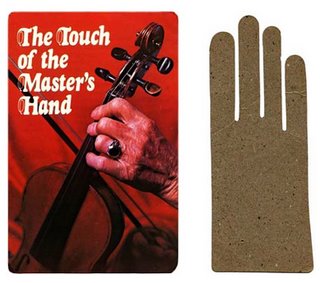
The Books, a multi-media group I was first introduced to as an audio entity, cares for an exploratory website which is not dissimilar to the construction of their music. Collecting bits and pieces of musical/vocal detritus to build patchy yet cohesive layers of sound, it can be seen they approach the same aesthetic visually at www.thebooksmusic.com. While still functioning as an info source for the activity of the group, they are happy to play with simple experiments in interactivity, using an assortment of found objects from all corners of the junk market spectrum, as well as junk found on the Internet.
Wednesday, August 02, 2006
Are you a smooth criminal?
"… In short, I maintain that all great men or even men a little out of the common, that is to say capable of giving some new word, must from their very nature be criminals – more or less, of course. Otherwise it’s hard for them to get out of the common rut; and to remain in the common rut is what they can’t submit to, from their very nature again, and to my mind they ought not, indeed, to submit to it….
… I only believe in my leading idea that men are in general divided by a law of nature into two categories, inferior (ordinary), that is, so to say, material that serves only to reproduce its kind, and men who have the gift or the talent to utter a new word. There are, of course, innumerable sub-divisions, but the distinguishing features of both categories are fairly well marked. The first category, generally speaking, are men conservative in temperament and law-abiding; they live under control and love to be controlled. To my thinking it is their duty to be controlled, because that’s their vocation, and there is nothing humiliating in it for them. The second category all transgress the law; they are destroyers or disposed to destruction according to their capacities. The crimes of these men are of course relative and varied for the most part they seek in very varied ways the destruction of the present for the sake of the better. But if such a one is forced for the sake of his idea to step over a corpse or waked through blood, he can, I maintain, find within himself, in his conscience, a sanction for wading through blood – that that sense I speak of their right to crime in my article (you remember it began with the legal question). There’s no need for such anxiety, however; the masses will scarcely ever admit this right, they punish them or hang them (more or less), and in doing so fulfill quite justly their conservative vocation. But the same masses set these criminals on a pedestal in the next generation and worship them (more or less). The first category is always the man of the present, the second the man of the future. The first preserve the world and people it, the second move the world and lead it to its goal. Each class has an equal right to exist."
Tuesday, August 01, 2006
In order to think outside the box, you first have to open the lid...
"K. Anders Ericsson of Florida State University argues that what matters is not experience per se but "effortful study," which entails continually tackling challenges that lie just beyond one's competence. That is why it is possible for enthusiasts to spend tens of thousands of hours playing chess or golf or a musical instrument without ever advancing beyond the amateur level and why a properly trained student can overtake them in a relatively short time. It is interesting to note that time spent playing chess, even in tournaments, appears to contribute less than such study to a player's progress; the main training value of such games is to point up weaknesses for future study. Even the novice engages in effortful study at first, which is why beginners so often improve rapidly in playing golf, say, or in driving a car. But having reached an acceptable performance--for instance, keeping up with one's golf buddies or passing a driver's exam--most people relax. Their performance then becomes automatic and therefore impervious to further improvement. In contrast, experts-in-training keep the lid of their mind's box open all the time, so that they can inspect, criticize and augment its contents and thereby approach the standard set by leaders in their fields."
Monday, July 31, 2006
Tactical Sound Garden

The Tactical Sound Garden [TSG] Toolkit is an open source software platform for cultivating public "sound gardens" within contemporary cities. It draws on the culture of urban community gardening to posit a participatory environment where new spatial practices for social interaction within technologically mediated environments can be explored and evaluated.
Everyone should read through this website, it is a really interesting project. It tackles technological mediation as well as public and private speheres of experience in urban environments. Original link from Rhizome
Saturday, July 29, 2006
Draculamatic
(Why do they not let you bring your own beer and food to a free screening in the park? I mean I know why, but that's pretty lame. So we sat just outside the fenced in area and it was okay.)

As the movie started the wind picked up a bit. Kronos began to play, and the crowd cheered as Dracula made his first appearance on screen.
Around us in the park (in the "real" world) the weather started leaning towards a thunderstorm. A few distant rumblings of thunder was enough for the more wary viewers to collect their blankets and head out. Most people stayed though, holding out for what eventually happened.
The storm drew nearer and louder, and while there was still no rain, very loud thunder and very bright lightning began to create a real drama that matched the contstructed drama of the pre-recorded film and live music soundtrack. The excitement of the crowd rose when a scene involving a ship at sea in a large thunderstorm came on, foreshadowing the fate of the participants in the crowd. A crash of lightning near the park was matched by one on screen. The increasing roar of the wind added a sensation that enveloped all in attendance who still wanted to see Dracula and the Kronos quartet, even if they got a little wet.
Well as the rain first started, it seemed as if this might happen, but eventually someone came on the microphone and declared the event cancelled because the radar showed the storm too close for comfort. At this point it was still a drizzle.
Then the skies opened like they only do after days of humidity with no relief. Everyone began to scramble and those who were inside the fence (where they couldn't bring their own beers) had to file out two small exits, while those who had planned to take a picnic were free to run out of there.
Amidst this un-mediated drama I digitally recorded onto photocells a visual representation of some of this pandamonium while I made my way back to the subway stop.

It was an exciting mixture of hollywood drama and real-life "There is a slight possibility that I may actually be struck by lightning" drama. One fleeing particpant yelled to his friends " Phillip Glass wrote in the thunder and lightning!" leaving me wondering if he hired Storm from the X-Men to play the weather that night.

Sunday, July 23, 2006
Some People Say I'm Hardcore
San Francisco's Bicycle Coalition recently held an event called Tour DeFat at speedway meadow in Golden Gate Park. Supporters of everyday use of bicycles as a main form of transportation all showed up to support each other and listen to music, eat food, drink beer (sponsored by the New Belgian Brewing Company), and look at some pretty interesting bikes...
..bizarro bikes.. 
a bike with a drum set attached to it..?

a bike which powered a nice cooling fan...

and of course the ever necessary...bike with wheels fully encircling it.
San Francisco has a large bicycling community which really pushes biking as a viable alternative to driving for day to day needs. They have also set up a city run "car share" program to encourage people to own only a bike, and borrow cars from this program for the times where a motor vehicle is necessary.
San Francisco's climate is probably the factor that makes this so viable. Because they don't get snow, and therefore don't salt and sand the streets, potholes are less of a problem here. And in general the weather is always perfect for riding a bike. It is warm during the day (low humidty and always a breeze) and cool at night, and the winters here are extremely mild, negating the need for fristbitten cycling commutes that make biking nearly impossible other cities on a more consistant basis.
It's good to see people taking advantage of their environemental situation to help the environment. Most roads here have bike lanes and there are days of "critical mass" bike ridings to clog the streets with bike traffic to raise awareness of biking as an alternative.
Wednesday, July 19, 2006
You took the earrings?
This is the original thirteen minute short version of Bottle Rocket by Wes Anderson and Owen Wilson. This short is the core of the full length movie, and it is interesting to see this harsher, less realized version of the full length.
..how does an asshole like Bob get such a nice kitchen?...
Tuesday, July 18, 2006
from moke with love...
Is it the hat and cigar or the individual?
An exercise in existentialism.
There appear to be two main ideas summarizing my thoughts over the past two months. The first idea concerns the role of content and spectacle in the actions and reactions of thoughtful minds. This idea is based upon what we can withdraw from the world, and based on what we can withdraw, what then can we add to it? The second is the idea of the individual versus society, the main question being something like: How is the individual both a product and component of society? I shall do my best to form my thoughts on both of these issues, starting with the former.
The world is full of two things: content and spectacle. Content is what fills the world. Spectacle is all which can ever be added to the world. When aimed to produce, we can do nothing more or less than expressing content in spectacle. One who experiences spectacle can have insight into the content expressed in the spectacle; can experience the content of the spectacle; or can conceptualize the spectacle and do neither. To experience pure content, we must not focus on the world. We must lose all conceptions. Only when unconceptual experience of the world is achieved will we be truly content.
Take note of this obvious duality which manifests itself even in linguistic expression. We use the word ‘content’ to express two seemingly distinct ideas. Content can be interpreted as essential meaning; or as having desires limited to what you have. Consider these synonymous: the essential meaning is to have desires limited to what you have.
In agreement with this is the fact that having desires beyond what you have is the source of all sorrow. We are never sad unless we are longing, wanting, or hoping for something. Whether it is a longing for the response from another individual, or for finding a part of yourself, your desires for things greater than what you have causes grief. We will be content when we can long for nothing we do not have. This is the essential meaning.
Even when recognized, it is an onerous task for the thoughtful mind to realize. It has been cast in the mold of a society 10,000 years in the making. Past is the most difficult enemy to content. Future is nothing more than desires created from the past. We desire only because society desires. There is no desire which is based from the individual. The true individual is content. We must strive to be individual. But if we strive to be individual, then we have had desires beyond our means, and we will never be content.
This conundrum may be the curse of the thoughtful mind. It may be a by product of the ability to conceptualize. In using concepts we lose the ability to experience without them. This is not to say we cannot have fleeting moments of unconceptual thought, because we do. When we achieve these moments, they tend to strike us furtively and leave us longing to know what we just felt. If the moment occurred during the first snow fall of the season standing on the bluffs of Montauk, we will likely to return during a similar time next year, attempting to relive the moment. This is almost certainly not met with success. It does not seem we can force unconceptual thought in this way. Though, it does appear possible to obtain this kind of thought through certain activities, including careful meditation, ‘zoning out’ on a nice day, and the use of drugs.
If unconceptualized thought were achievable on a long-term scale, it does not seem likely that we would be able to function in society. Even if we were to reject society by living alone is some forest, we would still have the conceptions which were forced upon us. We would still work to build ‘shelter’, obtain ‘water’, make ‘fire’, etc. We would desire these things. We know what they are. As hard as we try, we cannot forget these concepts or our need for them. Once an individual has been raised in society, it can no longer be free of conceptions. Conceptions are a product of society.
This may be where our essential anguish comes from. In attempting to be an individual, we must lose society. Embarking on this journey, we must lose a huge part of ourselves. We have only ever known ourselves through the conceptions of society. How can we begin to know ourselves without society? How can we even make sense of the world?
For thoughtful minds raised in a society, this is where companionship plays a central role. Because our thoughts are understood through a public language, we will never be content looking completely inward. We must look towards companionship to find ourselves. It is this point where I am most confused, and have been considering most recently. I think there is a constant struggle between companionship and identity. If you spend too much time interacting with other thoughtful minds, you will eventually lose your sense of the independent self. On the other side, if you do not spend enough time within society, you begin to lose a different—almost mysterious—part of yourself. We need other people to help us understand ourselves, because it is through other people (society) which we come to know anything. More importantly, it is societies teaching us of the past which has set the individual its present state.
From the moment we begin to learn language, we are destined to focus on the past. Our whole understanding of the world is through conceptions which come from some past set of people agreeing on how to think about something. We cannot develop our own way to think, as most other animals can. A lion cub may learn how to hunt from its elders, but it is not told how to think. It interprets the world as it chooses to. I do not think many people will object to the idea that a lion cub cannot understand that the elders were once lion cubs themselves, and they too learned to hunt from their elders.
On the other hand, we as humans have a very difficult time interpreting the world in any way other than how it was taught to us (i.e. how it was interpreted in the past). In this sense, our use of language and the formation of societies is both a blessing and a curse. In order to be blessed with all of the luxuries we enjoy everyday, we must accept the role of societies and sacrifice the ability to be content. Though, there may be so hope for content after all...
Because of the integral role society has in determining the individual, we are destined to desire something we do not have within ourselves. This is the reason friends, family, and lovers become so important in our lives. We become close with other people, in order to satiate a common desire. Some people chose objects and possessions to find companionship, others chose to leave a legacy behind, finding comfort in companionship with people across time. Still others turn to religion or a companionship with God.
There are two reasons that religion serves the thoughtful mind. The first is by providing an unconditional companion. The second is by ending the need for all worldly desires. That being said, religion will only function if one can truly be faithful. This total faith is what allows one to reject desires for that which they do not have on earth. They only desire for eternal happiness in heaven or some similar place. Because this goal is within their grasps, faithful people do not desire for something they do not have. Therefore they are content.
Even though companionship is so important, it is evident that one must retain a part of themselves which is truly individual. Our society’s obsession with secrets provides this evidence. When we have a secret, it is not only important for us to know, but it is important for other people to know we have a secret. We cannot be content simply knowing something no one else in the world knows. We must at least share the fact that we have a secret, even if we are unwilling to share the information itself. I find this observation truly insightful. It is very telling of the individual’s struggle with society, though I am not quite sure in what way precisely. I think discovering more about the nature of secrets will help reveal the roles society and the individual plays for the other. Maybe our desire to keep secrets stems from our desire to find out secrets (i.e. unlock the secrets of our universe). Then, keeping secrets would be a way to desire only what you have (i.e. to know only what you know). But there seems to be a selfish side to this idea, which I do not think is necessary…
NOTES (a.k.a. thoughts without a home):
I believe it is this reason which explains the ubiquity of religion. Religion provides the conceptual mind with a way to be content. The only requirement is faith. This is not to say that we should all pick a set of religious practices and devote our lives to them. I do not think we can manufacture faith in this manner.
If we could lose conceptual thought, we would not long for the companionship. Our thoughts would be pure experience. The world would not be demarcated in the ways that it is for us. We could be content.
Monday, July 17, 2006
Sunday, July 16, 2006
Better than Phones

Derk, Douglas and I just had a crystal clear, free three person conference call via the web app SKYPE which you can download for free from their website.
I was in my basement in Smithtown, NY

Derek was in his house in St. James, NY

And Douglas was on the balcony of his flat in Berlin, Germany.

I had heard a lot about Skype before, but this was my first time using it and it lived up to and exceeded expectations. It is interesting how the space you inhabit changes when you are also communicating with other people. It feels significantly different than a phone call and is also much better quality. All you need is headphones and a default computer microphone.
Skype also allows you to make calls from your computer to actual telephones (for free in the US, money for overseas).
Friday, July 14, 2006
Ugly Myspace Page Conteset

the show with zefrank
Check out his other shows and his blog too.
Here is a small photo project by Kevin Bewersdorf, involving mass design
Here is a project on my homepage that relates to myspace pages.
Once you open the doors of perception...
 The Doors of Perception is book in which Aldous Huxley expertly records his experiences with mescalin. Huxley describes a loss of concept and the profoundness that comes with pure perception. He gains a greater understanding into the origins of religion and is able to recognize the relentless reality which plagues schizophrenics. Without an escape from reality, we literally lose our minds. The concepts, symbols, language, etc. we develop provide a necessary vacation from the overwhelming nature of reality.
The Doors of Perception is book in which Aldous Huxley expertly records his experiences with mescalin. Huxley describes a loss of concept and the profoundness that comes with pure perception. He gains a greater understanding into the origins of religion and is able to recognize the relentless reality which plagues schizophrenics. Without an escape from reality, we literally lose our minds. The concepts, symbols, language, etc. we develop provide a necessary vacation from the overwhelming nature of reality.The following quote comes from the section of the book, after the account of his experiment, where Huxley reflects on the greater implications of mind-expanding experiences.
"That humanity at large will ever be able to dispense with Artificial Paradises seems very unlikely. Most men and women lead lives at the worst so painful, at the best so monotonous, poor and limited that the urge to escape, the longing to transcend themselves if only for a few moments, is and has always been one of the principal appetites of the soul. Art and religion, carnivals and saturnalia, dancing and listening to oratory—all these have served, in H. G. Wells's phrase, as Doors in the Wall. "
It seems to me, that now more then ever the human race is finding more and more solace in 'Artificial Paradises'. I don't think this is necessarily a bad thing. Our mind developed in such a way as to protect us from the harshness of reality. It seems only natural that as the development of technology continues our evolution, we begin to supplement the distractive powers of the mind. Music, movies, video games, virtual reality, etc. are increasingly more common in technologically advanced socieities. Taken to the extreme, we will one day be able to completely artificially recreate everything the mind needs to be content, and there we be no reason to do anything unpleasurable (all actual necessities - food, water, etc. - will be taken care of automatically). It is at this point where societies will cease to care about reproduction, and the human race will cease to exist... at least physically.
Below is a scan of an article discussing the previous viewpoint in reference to why we have yet to encounter any aliens. The article was in the April-May 2006 issue of Seed magazine. Seed tackles scientific issues with a political spin. It is usually worth the read. Cheers.
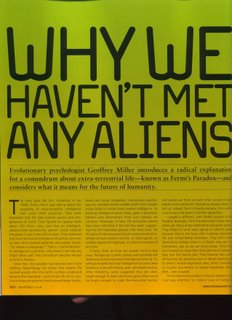
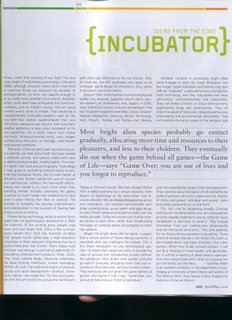
Thursday, July 13, 2006
Wednesday, July 12, 2006
Ray Kurzweil bit
Thanks to Moke for the Kurzweil link and info. I've heard a lot about that book as well as his newer one The Singularity is Near. I thought this was worth posting. It's from The Age of Spiritual Machines, Chapter Nine: 2009. Bear in mind this was written in 1998. Pretty amazing.
The Arts
The high quality of computer screens, and the facilities of computer-assisted visual rendering software, have made the computer screen a medium of choice for visual art. Most visual art is the result of a collaboration between human artists and their intelligent art software. Virtual paintings -- high-resolution wall-hung displays -- have become popular. Rather than always displaying the same work of art, as with a conventional painting or poster, these virtual paintings can change the displayed work at the user's verbal command, or can cycle through collections of art. The displayed artwork can be works by human artists or original art created in real time by cybernetic art software.
Human musicians routinely jam with cybernetic musicians. The creation of music has become available to persons who are not musicians. Creating music does not necessarily require the fine motor coordination of using traditional controllers. Cybernetic music creation systems allow people who appreciate music but who are not knowledgeable about music theory and practice to create music in collaboration with their automatic composition software. Interactive brain-generated music, which creates a resonance between the user's brain waves and the music being listened to, is another popular genre.
Musicians commonly use electronic controllers that emulate the playing style of the old acoustic instruments (for example, piano, guitar, violin, drums), but there is a surge of interest in the new "air" controllers in which you create music by moving your hands, feet, mouth, and other body parts. Other music controllers involve interacting with specially designed devices.
Writers use voice-activated word processing; grammar checkers are now actually useful; and distribution of written documents from articles to books typically does not involve paper and ink. Style improvement and automatic editing software is widely used to improve the quality of writing. Language translation software is also widely used to translate written works in a variety of languages. Nonetheless, the core process of creating written language is less affected by intelligent software technologies than the visual and musical arts. However, "cybernetic" authors are emerging.
Beyond music recordings, images, and movie videos, the most popular type of digital entertainment object is virtual experience software. These interactive virtual environments allow you to go whitewater rafting on virtual rivers, to hang-glide in a virtual Grand Canyon, or to engage in intimate encounters with your favorite movie star. Users also experience fantasy environments with no counterpart in the physical world. The visual and auditory experience of virtual reality is compelling, but tactile interaction is still limited.
that's what i'm talkin' aboutdifferential meanings collapse
The book is an in-depth analysis of many aspects of “personal stereo” use in urban life. (He uses the term “personal stereo” throughout the book rather than Walkman or iPod, those being trademarked names. In fact in the preface he states “…the Sony Corporation were not willing for the author to use the term in either the title of the book or its content… Rather than displaying any antipathy towards learned books, Sony appears to be concerned that, by giving permission to use the trademark in this instance, they might thereby compromise their ability to defend that trademark against other companies’ use of it in the future.”)
The later part of the book I found to be the most interesting. It's made up of some great chapters like “Aestheticizing Everyday Life: A Critique,” “Visual Theories of City Life and Personal-Stereo Use” and “Technology and the Management of Everyday Life.” Bull discusses in these chapters how listeners construct an “aesthetic” experience by the act of using a personal-stereo in otherwise “meaningless”, “random” or “chaotic” everyday goings-ons. Here’s a good excerpt:
“Personal-stereo users are, as I have noted, skilled strategists of auditory looking. The act of 'looking' to manufactured sound is inscribed in the behaviour of any citizen who has grown up with television, film and video and this is reinforced as they move around urban spaces with its canned music filling public spaces. An integral part of these mediums is the musical soundtrack that accompanies them, supplementing the narrative and giving an emotionally heightened expression to the image.”
Bull brings up Norman Denzin, an author of a book called The Cinematic Society as well as the situationist writings of Debord in the 1960s in the discussion of aestheticizing everyday experience. Denzin writes “Reality as it was visually experienced, became a staged social production. Real, everyday experiences came to be judged against their staged, cinematic, video counterpart. The metaphor of the dramaturgical society, or ‘life as theater’ ceased to be just a metaphor. It became an interactional reality.”
And Debord, “In societies where modern conditions prevail, all of life presents itself as an immense accumulation of spectacles. Everything that was directly lived has moved away into representation.” “…the spectacle is the dominant mode through which people relate to one another. It is only through the spectacle that people acquire a [falsified] knowledge of certain aspects of social life…”
I’ll post more on this later, but this book really opened my eyes to an area I hadn’t quite thought about before. Media and technology have quite significantly affected our perception and the way we relate to the world and each other. This book was written in 2000 and raises even more questions now, with media saturation and self-reference becoming more and more part of life. And of course the internet!?!?
Put Youself Into Perspective
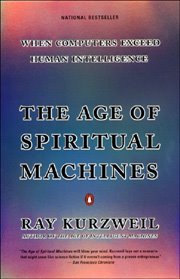 As far as I understand, Kurzweil discusses the future of the 'human race' when we become one with machines and our consciousness becomes all that really exists.
As far as I understand, Kurzweil discusses the future of the 'human race' when we become one with machines and our consciousness becomes all that really exists.If nothing else, check out the Timeline where Kurzweil predicts what the future will bring.
Enjoy.
Tuesday, July 11, 2006
What's so funny about peace, love and magic mushrooms?

From the WALL STREET JOURNAL'S Free Features Section comes a report on a study of the psychadelic effects of "magic" mushrooms by Ron Winslow; it yields interestingly positive results for the drug:
"A third of the participants said the experience with psilocybin was the single most significant experience of their lives, and an additional 38% rated it among their top five such experiences -- akin to, say, the birth of a first child or the death of a parent....Two months after the sessions, 79% of the participants indicated in questionnaires that their sense of well-being and satisfaction increased after the psilocybin episodes"
They also have a timeline in the article that makes you wonder where this sort of research has been for the past... forty years?
"It's remarkable that we have a class of compounds that has sat in the deep freeze for 40 years," Dr. Griffiths said. "It seemed to me scientifically it was high time to look again" at psychedelic agents."
thanks to Boing Boing for the link
Zefrank has reported on this issue as well....in video
Monday, July 10, 2006
Music from a Computational Universe
Check it out.
http://tones.wolfram.com
The following is an excerpt from the webpage.
"
 When prominent scientist Stephen Wolfram published A New Kind of Science in 2002, it was immediately hailed a major intellectual landmark. Today the paradigm shift that Wolfram's work initiated is starting revolutions in a remarkable range of areas of science, technology--and the arts. WolframTones is an experiment in applying Wolfram's discoveries to the creation of music.
When prominent scientist Stephen Wolfram published A New Kind of Science in 2002, it was immediately hailed a major intellectual landmark. Today the paradigm shift that Wolfram's work initiated is starting revolutions in a remarkable range of areas of science, technology--and the arts. WolframTones is an experiment in applying Wolfram's discoveries to the creation of music.  At the core of A New Kind of Science is the idea of exploring a new abstract universe: a "computational universe" of simple programs. In A New Kind of Science, Wolfram shows how remarkably simple programs in his "computational universe" capture the essence of the complexity--and beauty--of many systems in nature.
At the core of A New Kind of Science is the idea of exploring a new abstract universe: a "computational universe" of simple programs. In A New Kind of Science, Wolfram shows how remarkably simple programs in his "computational universe" capture the essence of the complexity--and beauty--of many systems in nature.
 WolframTones works by taking simple programs from Wolfram's computational universe, and using music theory and Mathematica algorithms to render them as music. Each program in effect defines a virtual world, with its own special story--and WolframTones captures it as a musical composition.
WolframTones works by taking simple programs from Wolfram's computational universe, and using music theory and Mathematica algorithms to render them as music. Each program in effect defines a virtual world, with its own special story--and WolframTones captures it as a musical composition.
 It's all original music--fresh from "mining" Wolfram's computational universe. Sometimes it's reminiscent of familiar musical styles; sometimes it's like nothing ever heard before. But from just the tiniest corner of the computational universe WolframTones can make everyone on Earth their own unique cellphone ringtone. It's a taste of what it's like to explore the computational universe--and a hint what's to come..."
It's all original music--fresh from "mining" Wolfram's computational universe. Sometimes it's reminiscent of familiar musical styles; sometimes it's like nothing ever heard before. But from just the tiniest corner of the computational universe WolframTones can make everyone on Earth their own unique cellphone ringtone. It's a taste of what it's like to explore the computational universe--and a hint what's to come..."
Sunday, June 18, 2006
link-a

link-a is an online multimedia art show which explores "(policies of afftectivity, aesthetics of biopower"). Curated byJuan Martín Prada and produced by medialab madrid. It includes 11 works and a few essays which are worth experiencing.
Thanks to Rhizome for the link.
